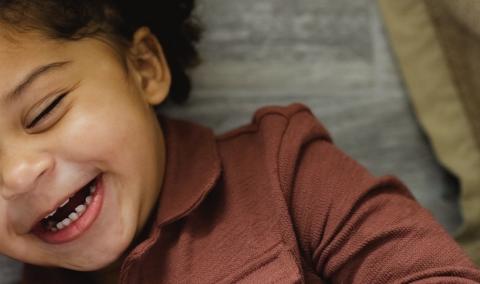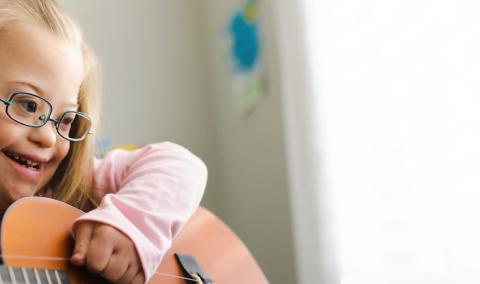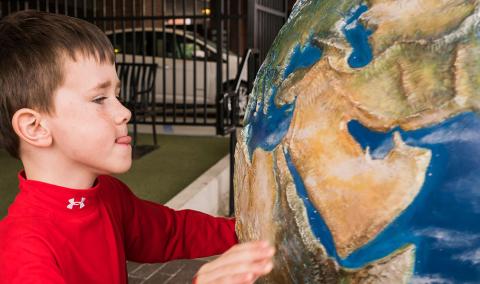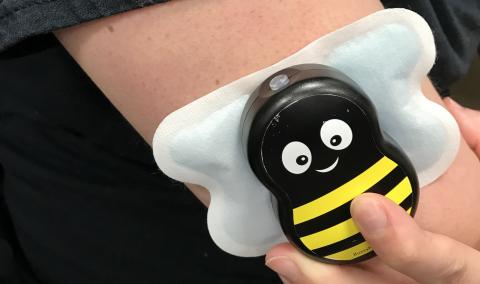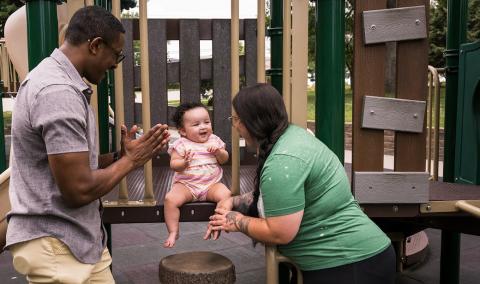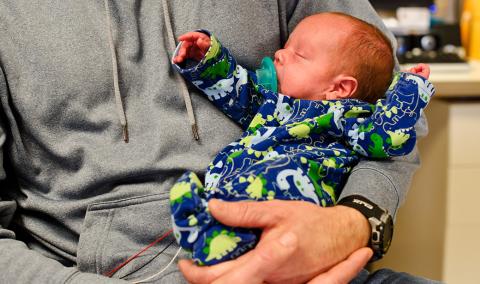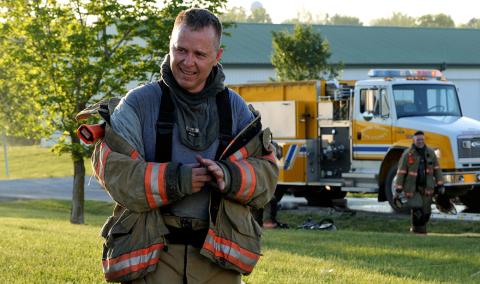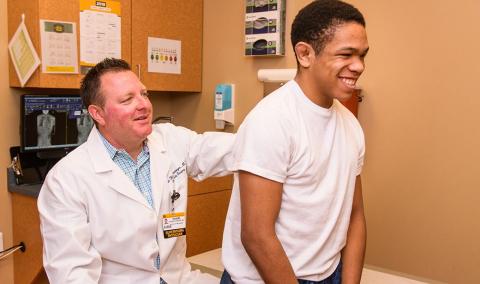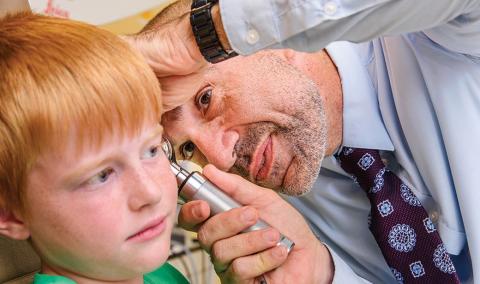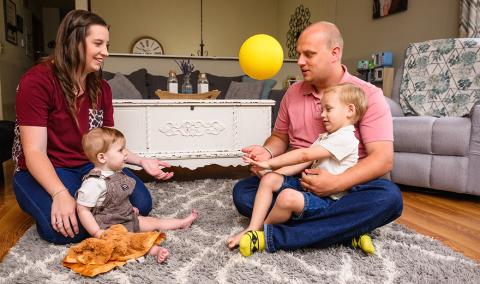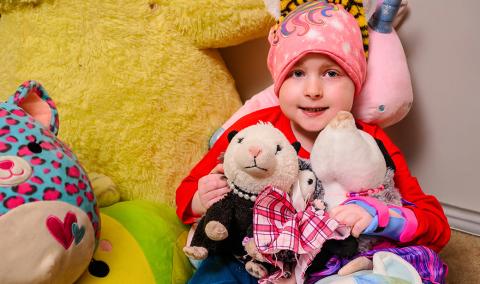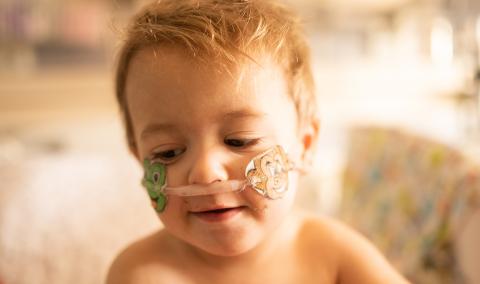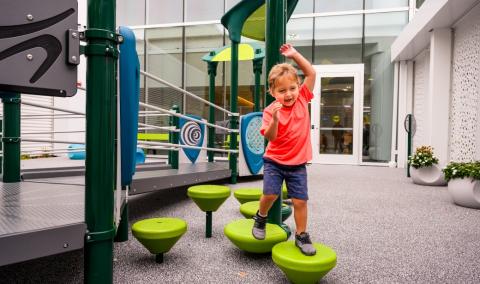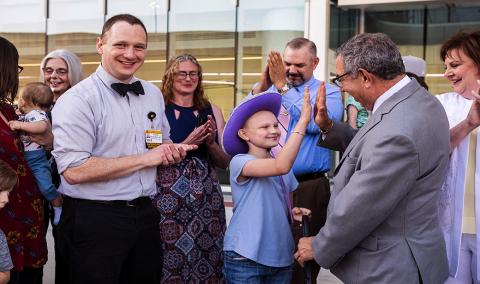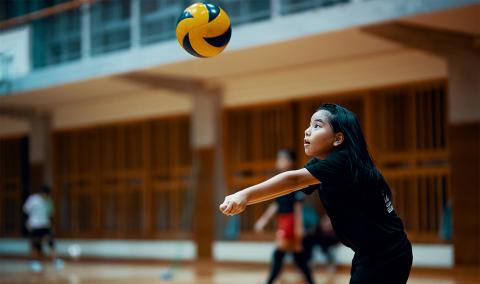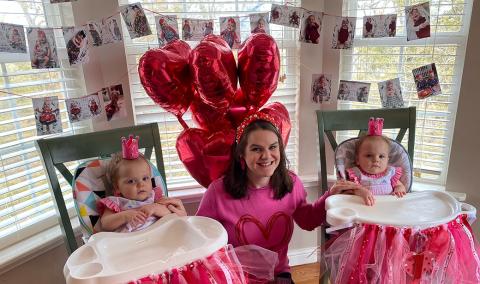MU Health Care’s pediatric sleep clinic offers a range of treatment and testing options for problems and disorders that affect a child’s sleep.
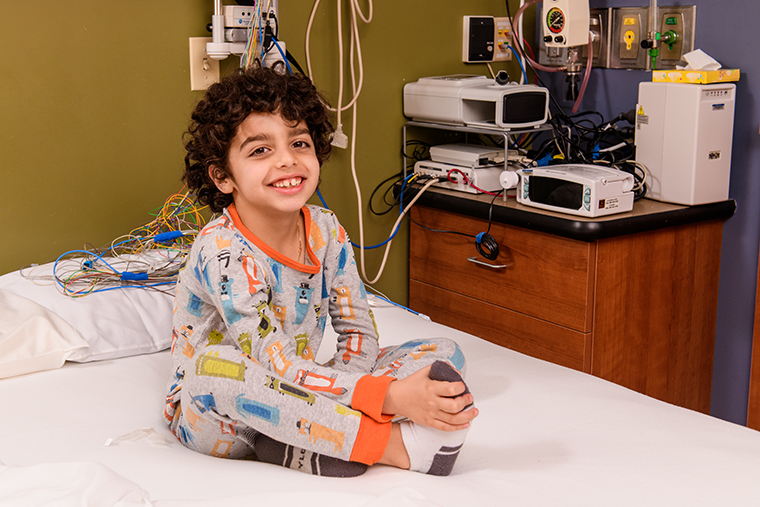
Work with the experts in pediatric sleep medicine
We have a team of world-renowned sleep specialists that focus on diagnosing and treating children. Sleep specialists around the world look to us and our work to learn about the best way to diagnose and treat sleep disorders in children. Our team has trained many of the current leaders of sleep medicine in the US and around the world.
Our research activities define the way of the future on how to deliver personalized and optimal care to children and to their families. Our researchers are constantly exploring new ways to improve sleep for children. We are currently researching why and how sleep conditions occur. We are also searching for new ways to detect and treat these issues in children.
Enjoy family-friendly spaces in our new Children's Hospital
Our sleep clinic is part of Children's Hospital and was created with the entire family in mind. All our spaces are designed to be fun, comfortable, and calming.
Our priority is to make sure you and your child have a comfortable experience, whether it's your first appointment or you're staying in one of our overnight sleep study rooms.
Comfort for overnight sleep studies.
Sleep study rooms are spacious and feature private bathrooms, parent beds, and a dedicated area for warming a bottle or preparing a light meal.
Unlike other sleep clinics, you can be near your child all night to soothe and comfort them as needed. We also have a variety of bed options for children of all ages, including cribs and small beds with rails.
How are common sleep problems diagnosed?
Sleep studies are the best way to diagnose sleep disorders. Our clinic offers two types of sleep studies to monitor, track and diagnose sleep disorders in children:
- Overnight sleep study (polysomnogram): Sleep specialists place small sensors on the surface of the skin before your child goes to bed. During sleep, we monitor your child's brain activity, breathing, eye movements, heartbeat, muscle tension and blood oxygen and carbon dioxide levels. If needed, special machines can be applied to help the children breathe well through the night and allow our team to optimize their therapy.
- Multiple sleep latency testing (MSLT): The MSLT test is similar to the polysomnogram. The key differences are that it's done during daytime hours, and we wake up your child several times throughout the test. We will likely recommend this test if your child has a problem with daytime sleepiness.
When caught early, sleep problems and disorders can be treated and managed and avoid future health problems. If not treated, your child may develop long-term (chronic) behavioral and health problems.
How are common sleep problems treated?
Treatment for sleep problems and sleep disorders vary and will depend on the diagnosis and your family's treatment goals.
Our treatment specialists will work with you and your child's health care team to come up with the treatment plan. Treatment plans may include one or more of the following options.
Home interventions
Sometimes, treatment focuses on making minor but helpful changes around bedtime and the home. Our sleep specialists will tailor a plan that is specific to your child and their sleep problems. This may include schedule changes, tips for a good sleep routine, and changes to the sleep environment.
Behavioral approaches
A sleep therapist or psychologist can work with you and your child to help address other issues that may be causing the sleep problem.
Medication
Your child may need medication to help them with their sleep disorder. We use these with great caution. Our team carefully weighs the benefits and risks to your child when considering medicine as part of their treatment plan.
CPAP treatment
If your child has sleep apnea, they will need continuous positive airway pressure (CPAP) therapy. This machine helps provide a constant flow of air to keep the airway open. This also helps your child if they snore.
Surgery
If necessary, your child may need surgery to correct their sleep problems. For example, sleep problems may be caused by craniofacial conditions, like cleft palate. Or they may happen due to enlarged tonsils. In some cases, removing the tonsils or adenoids helps children with sleep apnea.
Our sleep specialists will go over a treatment plan with you and make sure that you are comfortable with the plan and its goals.
When should I see a sleep specialist?
Sleep problems are hard to diagnose and not many doctors know how to spot these problems in children. There are a few frequent reasons why families come to us for care.
You've tried many things and your child's sleep hasn't improved.
You may have tried steps outlined by your pediatrician and had little or no improvement. You may also have tried tips outlined in several books without success.
Despite "good” sleep, your child still struggles with sleepiness.
You may think your child is getting enough sleep, but they are still groggy during the day or can't focus at school.
Poor sleep is affecting your child's daily life.
Your child may have mood swings, poor attention, and act out more at home and at school. They may also change their eating patterns and weight as a result.
Our team will help you and your child make progress towards better sleep and overall health. We can also provide a second opinion.
And, equally important—we know when it's not a sleep issue. In those cases, we refer you to other experts at MU Health Care if sleep problems are not the issue.
If you think your child has signs or symptoms of a sleep disorder, call us at 573-882-6921 to schedule an appointment.
Our team can discover if your child has a serious sleep disorder, like sleep apnea, narcolepsy, restless legs syndrome, sleep epilepsy, or another rare sleep disorder.
What to expect on your first visit
Your experience will depend on your child's needs. But you can always expect our staff to take a caring and personal approach to your child's care.
Your first appointment
During this visit, a doctor will complete the following:
- Ask about your child's medical history and sleep habits. This is your chance to let your doctor know what's going on and what your main concerns are.
- Complete a thorough physical exam. This will help the doctor check for other issues and get a better idea of your child's overall health.
- Request lab work to rule out other issues. Our sleep specialists may order blood tests to measure your child's blood sugar, insulin, cholesterol and triglyceride levels. This can help uncover other issues that may contribute to your child's poor sleep.
Using all this information, your doctor will create a plan to improve your child's sleep. That plan may include tips for the home and at bedtime, a sleep study or referrals to other specialists who can help.
Support services for families of children with sleep disorders.
Our team is always available to answer questions and offer support throughout the process. We provide detailed information about sleep problems, related disorders, sleep studies and treatment plans.
We can connect you to other families and support groups for a variety of sleep disorders. And we'll put you in touch with other pediatric specialists at MU Health that can support your child's success.
We will also help you understand what your insurance covers. If insurance does not cover recommended treatment options, we will help you understand and consider other options.
Together, we will help you make informed decisions so your child can have better sleep.
Related Conditions & Treatments
- Adolescent Medicine
- Chest Wall Deformities
- Down Syndrome
- Emergency Care for Kids
- Gastrostomy and Feeding Access Program
- Hyperbaric Oxygen Therapy
- Juvenile Diabetes
- Neonatology
- Pediatric Anesthesiology
- Pediatric Cancer
- Pectus Carinatum
- Pectus Excavatum
- Pediatric Cardiology
- Pediatric Dermatology
- Pediatric Development and Behavior
- Pediatric ENT (Ear, Nose and Throat)
- Pediatric Epilepsy
- Pediatric Eye Care
- Pediatric Gastroenterology
- Pediatric Infectious Diseases
- Pediatric Inpatient Rehabilitation
- Pediatric Nephrology
- Pediatric Neurology
- Pediatric Neurosurgery
- Pediatric Orthopaedics
- Pediatric Plastic Surgery
- Pediatric Primary Care
- Pediatric Psychiatry
- Pediatric Pulmonary Medicine
- Pediatric Sleep Medicine
- Pediatric Surgery
- Pediatric Surgical Services
- Pediatric Urology
- Pediatric Vascular Anomalies
- Pediatric Weight Management
- Sickle Cell Disease
- Aerodigestive Program



